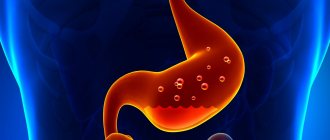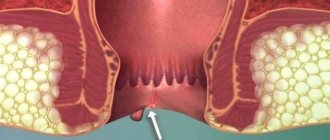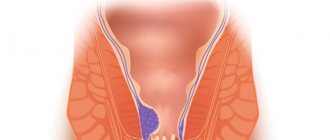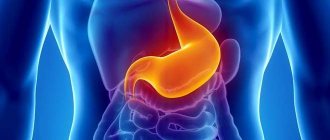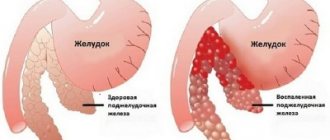For various reasons, people today turn to alternative medicine. Some believe that this method is effective, but doctors and pharmaceutical companies are not telling the truth and producing counterfeits. How does soda affect the stomach for gastritis and can it be taken at all?
According to some, this mineral neutralizes acidity, which helps eliminate heartburn. But why is this method not always effective and also unsafe? What needs to be done to avoid harming the body? How to use it correctly and is it worth it?
Baking soda is a powdery white substance that is odorless and has bactericidal properties. For this reason, it is used to eliminate inflammatory processes, cleanse the body, and thin the blood and blood vessels. It is important to remember that it is impossible to cure the disease with sodium bicarbonate. Therefore, without prescriptions and consultations with a doctor, you should not self-medicate. Some people believe that it is a panacea for many diseases. Let's see if this is true?
Myth 1. Baking soda for heartburn is the best remedy.
What happens after soda enters the stomach? A chemical reaction occurs in which carbon dioxide is released, which irritates the walls of the stomach and intestines. This process provokes the release of a new portion of hydrochloric acid, disrupting the functioning of the gastrointestinal tract. Yes, at first you feel relief, the heartburn disappears, but after that the condition worsens. Excess NaHCO3 in the body disrupts the acid-base balance, which leads to swelling and increased blood pressure. Therefore, it is better to use it in rare cases, as an emergency remedy, if there are no other antacids nearby. The appearance of heartburn may be a manifestation of a serious illness; it is recommended to consult a specialist.
Myth 2. Helps get rid of alcohol and drug addictions
Dependence on bad habits can be formed not only on the physical, but also on the mental level. It occurs gradually with increasing doses and constant use of any of the substances. With mental dependence, only achieving a state of comfort will help a person. Soda will not help you get rid of addiction in any case, nor does it replace the substance and its effect. It can temporarily relieve hangover syndrome and reduce the thirst to drink. But, it is important to remember that excessive or regular use is contraindicated for those who have digestive problems, since soda affects the production of hydrochloric acid.
Myth 3. Effective in preventing and treating cancer
Many people today are trying to find a cure for cancer. Some recommend turning to alternative treatments. One of the cheapest methods is baking soda. Can such a simple powder really be so effective and fight a serious illness, without radiation or chemicals? During illness, malignant cells progress, provoking the active growth of tumors, as the immune system ceases to fight them.
Soda does not treat similar diseases; it is even more dangerous if used uncontrollably and without reason. Even for cancer prevention, NaHCO3 is useless, since cancer is not caused by the Candida fungus, but by the accumulation of mutations in cells. Opinions about sodium bicarbonate treatment differ, so it is better not to take risks and not self-medicate. It is necessary to remember the consequences that may arise: disruption of the stomach, salt deposition.
Myth 4. Soda will help you lose extra pounds and cleanse yourself of toxins.
You can lose weight after drinking baking soda, but not without harm to your health. Experts say that the kidneys and liver exist to cleanse the body; this is enough to eliminate harmful substances. According to some statements, it breaks down fats, reduces appetite, which promotes weight loss. But not everyone agrees with this, especially since it is harmful to the stomach, especially if a person suffers from gastrointestinal diseases.
Once in the stomach, soda inhibits the digestion of food, which is why appetite disappears. However, if the acidity was normal before eating, the organ begins to react and release a portion of gastric juice. Before this time, NaHCO3 loses its effect, the stomach is damaged, erosion appears, and subsequently an ulcer. With low acidity, drinking soda leads to atrophic gastritis and other problems associated with the gastrointestinal tract.
Myth 5. Helps reduce stomach acidity
At different pH levels, chemical reactions occur in the human body, to which tissues are quite sensitive. Therefore, even minor changes can disrupt the functioning of enzymes. A reduced acidity level is a relative indicator. When hydrochloric acid is discharged, it increases. But, in addition to the juice, bile also enters the organ, causing bitterness in the mouth. Soda will not act as a medicine and its healing properties in this case have not been proven.
Benefit or harm?
Soda can bring not only beneficial benefits, but also harm to the entire body. What is the benefit of using soda?
It has been established that soda is important for the digestive tract. If there are no diseases in the digestive tract and the intestinal and stomach systems are in order, then the properties of soda may have the following characteristics:
- baking soda has cleansing properties;
- helps reduce acidity;
- has alkaline characteristics;
- has bacterial qualities;
- rids the body and intestinal tract of a wide variety of parasites;
- has antiseptic properties;
- promotes pain relief in the digestive tract.
An overly polluted body can develop many pathogenic microorganisms. For this reason, you can cleanse the body of toxins and the digestive organs of various contaminants with the help of soda, which is sold in any store.
Despite the fact that soda does not have the ability to bind harmful elements and eliminate free radicals from the body, its cleaning effect is expressed due to the fact that it has an alkaline environment.
When normalizing the acid-base balance with the help of baking soda, healing actions are carried out in the human body, which help eliminate cholesterol plaques on the vascular walls.
It is of great importance to normalize the pH level and the activity of the digestive tract. All the anti-heartburn properties of baking soda have been established a long time ago. Its properties help relieve a person from painful heartburn after 2-3 minutes. However, it must be remembered that by regularly drinking soda during heartburn, it is possible to get the opposite effect. Changing the alkaline environment in the body can only worsen the patient’s well-being.
Baking soda helps relieve pain in the muscle ligaments of the intestines. Using baking soda can eliminate painful spasms in the digestive tract.
But what harm can there be in using baking soda if it contains so many positive aspects for the intestines and stomach? Of course, if you follow certain rules for using sodium bicarbonate, then the use will not be harmful. With regular use, sudden changes in doses and in the absence of consultation from the attending physician, the use of soda solutions is under no circumstances allowed.
At higher dosages, the following symptoms appear:
- increase in body temperature;
- the appearance of dizziness, nausea;
- strong thirst appears;
- swelling of the lungs is possible;
- increased blood pressure.
Using soda to treat peptic ulcers of the digestive tract is very harmful, since the result can be compared to drinking carbonated drinks every day. By introducing itself into the gastric tract, soda helps neutralize the acidic environment, releasing a significant amount of carbon dioxide, which leads to bloating.
Constant intake of soda contributes to the destruction of intestinal microflora, leading to the formation of new ulcers. In addition, soda can cause permanent damage to the digestive tract.
The effect of sodium bicarbonate on the human body
When acid enters the lower part of the esophagus, a burning sensation begins in the upper part. As you know, the mineral is able to neutralize acid. When substances interact, a hissing reaction appears, accompanied by the release of carbon dioxide. As a result of the chemical reaction, the acid level decreases. This helps to temporarily relieve the discomfort associated with high acidity.
But the carbon dioxide formed during the reaction, entering the stomach, contributes to the formation of new portions of hydrochloric acid. Half an hour after consuming the product, the acidity level rises to the previous level, sometimes exceeds it. Patients suffering from gastritis should remember that bicarbonate does not eliminate the cause of discomfort, but only temporarily relieves discomfort!
Use of soda in cooking
In cooking, soda is used widely and often; its nutritional qualities have been studied for a long time. The effect of the substance is amazing. When added to the dough, the mass becomes light, airy and porous. The bubbles formed due to the release of carbon dioxide are a natural leavening agent for the dough. Experienced chefs know about the properties of the powder and use it for cooking baked goods and meat.
As you know, patients with gastritis should adhere to a strict diet. Fresh baked goods, bread and other baked goods made with yeast dough have a negative impact on digestion. This type of dough enhances fermentation processes, leading to an increase in acidity.
Baking from dough made with soda does not increase acidity and is less harmful to the stomach.
Recipes at home
Recipes for the stomach and intestines that include soda are not difficult and their preparation does not require a lot of time and many ingredients.
- To prepare the medicinal solution you will need water and soda. Dilute 1 tsp in 200 ml of warm water. soda, then the whole mixture should be mixed. This recipe will help relieve painful spasms in the digestive tract, eliminate heartburn and help relieve the consequences of food poisoning.
- Soda can be used for gastric ulcers. To do this, take baking soda and sea buckthorn oil. To prepare a medicinal recipe, you need to take 1 tsp. sea buckthorn oil and 50 ml of 2% sodium bicarbonate solution. You can carry out treatment in this way for a month, consuming it 30 minutes before meals, three times a day.
- Another recipe for eliminating the consequences of food poisoning. To do this, you need to make a weak soda solution with water. This procedure is usually best performed using a probe and funnel. This is problematic to do at home, but soda helps to perfectly eliminate the consequences of such types of poisoning as: food, chemical, and overdoses of various substances.
- In addition, such a solution will be useful for a variety of infections, acute disorders and digestive problems.
- Baking soda can be used as a remedy for constipation because it has laxative properties. To prepare the recipe, take 200 ml of warm milk and add 1 teaspoon of soda to it. This solution should be drunk in one gulp. After 5-10 minutes, significant relief will occur.
- To normalize the pH level, and also use soda as a preventive measure for the intestinal tract, soda can be used on an empty stomach once every 10 days, dissolving 1 teaspoon of soda in 200 ml of boiling water.
How to use?
Rules for using sodium bicarbonate for stomach diseases:
- Soda is consumed only in the form of an aqueous solution.
- The substance dissolves in warm water; it is not recommended to take hot or cold water.
- Do not consume soda that has been left in the open for a long time, in the light or sun.
- There should be no foreign inclusions in the powder; all particles in the soda solution should dissolve.
- The solution should be drunk slowly.
- After you drink the solution, it is not advisable to take a horizontal position.
- The solution should be taken one hour after meals.
- The dose should be a quarter of a teaspoon. In extreme cases, you can increase to half a spoon.
If heartburn bothers you, you should dissolve half a teaspoon of soda in a glass of warm boiled water and drink in small sips.
It should be used when absolutely necessary, since the resulting carbon dioxide subsequently stimulates the formation of hydrochloric acid.
How to use soda for gastritis
Gastritis is a disease whose prerequisites are considered to be multiple conditions:
- poisoning;
- increased acidity in the stomach;
- consequences after ulcers and various injuries of the mucous membranes.
There are several types of gastritis, depending on the prerequisites for its development. Due to disturbances in the level of acidity in the gastric tract, 2 types of gastritis are formed: corrosive and fibrinous gastritis. In such cases, baking soda helps reduce pain and will make a person feel better for a while. Using baking soda for gastritis is quite a risky action, since alkali can harm the mucous membranes at low acidity.
With excessive consumption of soda solution, when it enters the gastric tract, soda reacts with hydrochloric acid, turning into carbonic acid. In this case, carbon dioxide and water are released. During gastritis, this can become dangerous due to the fact that it can cause fullness of the stomach, perforation of its walls, and this leads to excessive damage to the mucous membranes.
Soda with low acidity can lead to alkalization of the body and subsequent constipation. This leads to stagnation in the intestinal tract, for this reason, before you add such a method to your treatment, it is necessary to check the pH level. For gastritis, a soda solution in small quantities can eliminate pain and relieve heartburn with one-time use.
Experts advise using soda solutions for gastritis only in emergency situations and categorically do not allow the use of such a solution as a permanent remedy.
If the doctor, during the examination, finds significant contraindications to the use of soda, then in case of high acidity it is possible to limit the intake of alkaline mineral water. You should definitely follow a specific diet plan determined by a specialist. You will have to completely eliminate all spicy, salty, smoked, sour products, as well as alcoholic drinks.
Be sure to consult a gastroenterologist for advice if you decide to treat gastritis with soda!
Disadvantages of drinking soda for the body
It can be used for internal or external treatment only after carefully studying the rules for its use. If you do not adhere to them, unwanted side effects occur:
- Stomach dysfunction. Once in the organ, baking soda neutralizes hydrochloric acid. Heartburn and heaviness in the stomach disappear instantly, but the process is accompanied by the release of carbon dioxide. Taking a concentrated solution will lead to bloating and pain in the intestines.
- Burns. When rinsing the throat and mouth, you must use weak solutions. By acting on the delicate mucous membrane of the mouth and throat, the product will cause a burn.
- Allergy. Treatment of cough gives a noticeable effect, therefore it is common among adults and children. It should be remembered that the influence of soda vapors and rinsing solutions can cause a burn in the oral cavity and provoke an allergic reaction.
- Irreversible metabolic disorder. In pursuit of healing, people diagnosed with cancer become followers of the Italian former oncologist Tulio Simoncini. When using soda solution, using injections with HCO3, you must be careful. There is a known case of a patient dying from a heart attack caused by metabolic alkalosis (exceeding the level of bicarbonate in plasma) due to excess soda in the body. He was given 7 injections, which were enough to cause death.
- Change in blood pH. There are many recipes for using baking soda for weight loss. It should be remembered that the internal use of sodium bicarbonate can provoke diseases of the digestive system and shift the pH balance of the body.
Recommended for you:
How to treat psoriasis with soda: the effective method of Professor Neumyvakin, reviews
It is not difficult to avoid overdose and the consequences of taking solutions if you know the basic precautions. In order not to cause gases in the intestines and not to disrupt the digestion process, it is recommended to use slaked soda.
The optimal temperature of the finished solution is 35-40˚C. The dose must be increased gradually. If signs of poisoning appear as a result of taking it, you must stop taking the powder.
During treatment, it is advisable to limit the intake of “sour” foods as much as possible: meat, fish, legumes, eggs, sugar-containing and flour products. Celery, cucumbers, tomatoes, lettuce, beets, carrots, apricots, melons, and watermelons will benefit. Diet and exercise are integral components of the treatment and prevention of diseases.
Duration of use
Soda has found use in a variety of areas. It is used not only in cooking, but also for medicinal purposes. There are a large number of diseases and recipes that can be treated with soda. However, before treating any illness with soda, you should consult your doctor, as you may have direct contraindications to the use of soda.
The duration of use should not be constant. This is strictly prohibited, since this can cause ulcers and other disorders in the digestive tract. The average duration of treatment can be 7 days, but no more than 10. If you just want to maintain your gastrointestinal health, you can simply use a soda solution once every 10 days.
Reviews from people about soda treatment
On the advice of a friend, the woman drank a soda solution, wanting to cope with the disease. I used it as recommended, starting with small doses and gradually increasing. I didn’t notice any results, but the heartburn attacks went away. The stomach pain continued, although the course of treatment lasted three weeks. Now he takes the medicine prescribed by the doctor.
Some people respond positively to the treatment because they felt relief. Experts in this field say that medications based on sodium bicarbonate help well and allow you to forget about gastritis for a long time. But it is also necessary to understand that not everyone’s body reacts the same way; it depends on the state of health and what complications may arise after the illness. An integrated approach is often required, so it is better not to start taking the drug without a visit to the doctor. Self-medication often leads to complications and the consequences are difficult to predict.
Contraindications
Using soda with the correct and acceptable doses, the product will have a beneficial effect on the human body, but it is necessary to violate the recommendations of a specialist, and soda will turn into a harmful method of treatment. Soda therapy does not have to be carried out for a long period of time and in significant volumes. Soda will help relieve discomfort in the esophagus and is used for other diseases. But you should refrain from drinking soda in the following situations:
- If there is increased sensitivity to the elements of the product.
- With serious pain in the stomach, intestinal tract disorder occurs.
- Women during pregnancy should not be treated with soda.
- For pain in the heart area and in the presence of diseases of the heart and blood vessels.
- Soda treatment should not be used by people with diabetes.
By ignoring the rules of soda therapy, a person may experience painful cramps in the stomach, loss of appetite, nausea and vomiting, diarrhea and pain in the head. If you notice these signs, stop soda therapy, as if you violate this rule, you may experience seizures.
Baking soda
Usually, soda is drunk for gastritis with a high level of acidity: for hyperacid, erosive, mixed gastritis, as well as for conditions such as gastroesophageal reflux and peptic ulcer disease.
In fact, the use of this remedy is allowed only for uncomplicated hyperacid inflammation without pronounced atrophic or erosive changes in the mucous membrane and for gastroesophageal reflux. In the presence of erosions and especially ulcers, sodium bicarbonate increases the risk of bleeding and inhibits the healing of the mucous membrane.
Baking soda is contraindicated in hypo-, anacid, atrophic gastritis, since in these cases the acidity is already reduced, and the pain syndrome has a completely different mechanism associated with overdistension of the stomach.
Patients with reflux gastritis should also not drink soda. This condition is caused by the reflux of bile into the stomach from the duodenum, which has an alkaline reaction. Additional alkalization of the stomach contents with a soda solution will only increase inflammation.
Side effects
Soda, like any medicine, has certain side effects. Before drinking soda, be sure to read the list of side effects.
When using a soda solution, carbon dioxide will be released, which may cause bloating. Because of this, the stomach will begin to produce increased amounts of acid, which can also provoke unpleasant consequences.
Long-term use of soda treatment can lead to:
- nausea and vomiting;
- increased blood pressure;
- provoking cramps and swelling;
- deterioration in general health.
Frequent use of soda solutions can cause infectious diseases of the digestive system. The negative effect of soda leads to disruptions in the gastrointestinal tract.
